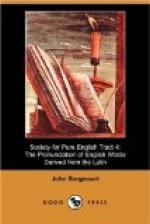La[’o]dam[’i]a, that at Jove’s command—
nor Landor in
Art[’e]mid[’o]ra, gods invisible—
though I hope that they did.
* * * * *
It is not to be thought that these rules were in any way arbitrary. So little was this so that, I believe, they were never even formulated. If examples with the quantities marked were ever given, they must have been for the use of foreigners settling in England. English boys did not want rules, and their teachers could not really have given them. The teachers did not understand that each vowel represented not two sounds only, a long and a short, but many more. This fact was no more understood by John Walker, the actor and lexicographer, who in 1798 published a Key to the Classical Pronunciation of Greek and Latin proper names. His general rule was wrong as a general rule, and so far as it agreed with facts it was useless. He says that when a vowel ends a syllable it is long, and when it does not it is short. Apart from the confusion of cause and effect there is the error of identifying for instance the e in beatus and the e in habebat. Moreover, Walker confounds the u in ‘curfew’, really long, with the short and otherwise different u in ‘but’. The rule was useless as a guide, for it did not say whether moneo for instance was to be read as ino-neo or as mon-eo, and therefore whether the o was to be long or short. Even Walker’s list is no exact guide. He gives for instance M[=o]-na, which is right, and M[=o]-n[ae]ses, which is not. Now without going into the difference between long vowels and ordinary vowels, of which latter some are long in scansion and some short, it is clear that there is no identity. In fact Mona, has the long o of ‘moan’ and Mon[ae]ses the ordinary o of ‘monaster’. A boy at school was not troubled by these matters. He had only two things to learn, first the quantity of the penultimate unit, second the fact that a final vowel was pronounced. When he knew these two things he gave the Latin word the sounds which it would have if it were an English word imported from the Latin. Thus he finds the word civilitate. I am not sure that he could find it, but that does not matter. He would know ‘civility’, and he learns that the penultima of the Latin word is long. Therefore he says c[)i]v[)i]l[)i]t[=a]t[)e]. Again he knows ‘[)i]nf[)i]n[)i]t’ (I must be allowed to spell the word as it is pronounced except in corrupt quires). He finds that the penultima of infinitivus is long, and he therefore says [)i]nf[)i]n[)i]t[=i]v[)u]s. Again he knows ‘irradiate’, and finding that the penultima of irradiabitur is short he says [)i]rr[=a]d[)i][)a]b[)i]t[)u]r. It is true that some of these verb forms under the influence of their congeners came to have an exceptional




